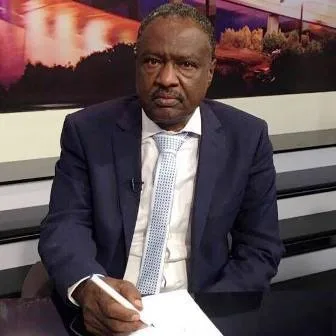A Prime Minister in Collapse

Rashid Abdel Rahim
The principal value upon which Dr Kamil Idris was chosen for the position of Prime Minister was his connection with the outside world, with international institutions, and with the West. And in that world, the virtues of freedom, respect for the press, and enabling journalism to perform its role are greatly esteemed.
Yet the Prime Minister has failed to uphold this principle, as his office filed a complaint against a journalist for an article about him.
The complaint followed a moment of collapse by the Prime Minister, according to his political adviser’s statement.
We are facing a war, immense pressures, and huge challenges — and the last thing we need is a Prime Minister who collapses because of a newspaper article, not because of the fall of El-Fashir.
This is a Prime Minister who spent his entire professional life in the West, where the press confronts officials boldly, exposes what is concealed, and highlights their weaknesses — and, despite that, the press earns respect.
Anyone who enters public life knows that they are subject to criticism, and perhaps even vilification and abuse — justified or otherwise.
The case of the article by journalist Azmi Abdelrazek has revealed several aspects casting doubt on Dr Kamil Idris’s suitability for this high office.
His political adviser, Mr Mohammed Mohammed Khair, stated that Kamil had been providing a “charitable donation” of 500 US dollars a month for fifteen years.
The Prime Minister remained silent until the moment of his dispute with the journalist, when he revealed this “charity” — thereby confirming that what he had offered was not an act of benevolence, but a stick to be raised in the journalist’s face whenever needed to silence or intimidate him, if the account is true.
A premeditated intention to buy the silence of the press.
A single incident — triggered by a newspaper article — has shown that we are being governed by a Prime Minister incapable of fighting battles or standing firm in the face of criticism.
We had expected Mr Kamil to deliver achievements commensurate with the war we are living through, its consequences, and the major problems our country is facing.
It is shameful that we witness such squabbling and bickering, one of whose parties is the second man in the state, while the army is advancing decisively in critical battles, and the people — generous and noble — are supporting those displaced by war and the militia. Meanwhile, Dr Kamil cannot spare even a moment to address the victors in Kordofan or the displaced in Addabba.
Traditionally, mediators step in in such situations, and settlements are reached by withdrawing the complaint and demonstrating goodwill. I hope this case is allowed to run its full course to a judicial ruling, through which we may understand the principles by which public affairs are being managed in our country.
It is clear that the government suffers from a lack of oversight by its Prime Minister; that is why people see no action from it and feel no presence. The government has not achieved any notable steps in returning to the capital, Khartoum — a return we had hoped would bring back universities and schools in preparation for the new academic year, alongside restoring essential services such as electricity, water, healthcare, hospitals, and medical centres.
God has blessed our country with good agricultural seasons, yet the absence of government has diminished the benefit of these seasons — in providing fertiliser and pesticides, improving irrigation, and ensuring water supply.
The country was paralysed for many long months in search of a Prime Minister — and once found, he then wasted time forming his government, which he appointed and then neglected.
Shortlink: https://sudanhorizon.com/?p=8863

